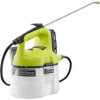Ryobi P2810 Operation Manual - Page 8
Save These Instructions - code
 |
View all Ryobi P2810 manuals
Add to My Manuals
Save this manual to your list of manuals |
Page 8 highlights
SPECIFIC SAFETY RULES water for at least 10 minutes, then seek immediate medical attention. Following this rule will reduce the risk of serious personal injury. Do not use battery-operated appliance in rain. Exercise care in handling batteries in order not to short the battery with conducting materials such as rings, bracelets, and keys. The battery or conductor may overheat and cause burns Do not dispose of the battery(ies) in a fire. The cell may explode. Check with local codes for possible special disposal instructions. Do not open or mutilate the battery(ies). Released electrolyte is corrosive and may cause damage to the eyes or skin. It may be toxic if swallowed. Avoid Dangerous Environment - Don't use appliances in damp or wet locations. Use Right Appliance - Do not use appliance for any job except that for which it is intended. Don't Force Appliance - It will do the job better and with less likelihood of a risk of injury at the rate for which it was designed. Store Idle Appliances Indoors - When not in use, appliances should be stored indoors in dry, and high or locked-up place - out of reach of children. Maintain Appliance With Care - Keep clean for best performance and to reduce the risk of injury. Follow instructions for changing accessories. Inspect appliance cord, and if damaged, have it repaired by an authorized service facility. Keep handles dry, clean, and free from oil and grease. Check Damaged Parts - Before further use of the appliance, a guard or other part that is damaged should be carefully checked to determine that it will operate properly and perform its intended function. Check for alignment of moving parts, binding of moving parts, breakage of parts, mounting, and any other condition that may affect its operation. A guard or other part that is damaged should be properly repaired or replaced by an authorized service center unless indicated elsewhere in this manual. SAVE THESE INSTRUCTIONS 4 - English















